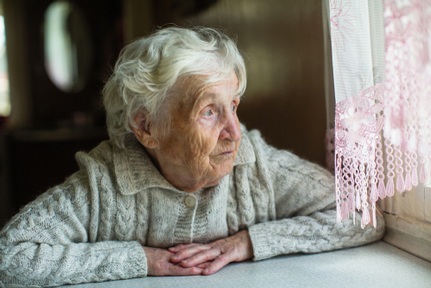Number of dementia deaths from people living at home rose by 79% during pandemic
The number of people with dementia dying at home has risen by 79 per cent during the pandemic, according to new statistics.

The Office for National Statistics (ONS) revealed 2,095 more people died at home from dementia and Alzheimer’s disease, between March 14 and September 11, in England, than the average recorded for the same period over the past five years, which is a rise of 79 per cent.
The UK started feeling the effects of the pandemic in March and went into lockdown on 23 March 2020.
Women have been particularly affected according to the ONS, with 1,335 more women dying at home between 14 March and 11 September with dementia and Alzheimer’s compared to the five year average, which is a 75 per cent increase.
Meanwhile in Wales, the number of women at home dying from dementia and Alzheimer’s disease is almost double the five-year average, up 92 per cent. ONS also found hospital deaths of women involving dementia and Alzheimer’s disease fell by 40.6 per cent in England and 25.5 per cent in Wales.
Samantha Benham-Hermetz, director of Policy and Public Affairs at Alzheimer’s Research UK, said: “The fact that more people are dying from dementia in their homes than ever before is truly heartbreaking and the news will come as a tragic blow to all those affected by the condition. These sobering figures must act as a wake-up call to government of the enormous challenge of dementia, and the urgent need to find life-changing treatments.
Is huge increase due to people being unable to access medical care during pandemic?
"Research will be needed to fully understand why significantly more people with dementia are dying at home. Many people say they would prefer to die at home, but we need to understand whether people with dementia are able to access the medical help they need during the COVID-19 pandemic. It’s likely that factors such as social isolation and people’s fear of coming forward to access the medial care they need has led to such a huge increase, which is why it’s more important than ever that people with dementia are not neglected."
During the 2019 election, the government promised to increase its spending on dementia research to over £160 million a year. Ms Benham-Hermetz added: “We are yet to see any further commitment to this pledge. This must not be an empty election promise, as there are almost one million people in the UK living with dementia who are desperately waiting for life-changing treatments. They have already been forced to wait too long, and until such a treatment exists, we will continue to see more people dying from dementia year-on-year. We need to act now to protect people with dementia.”
The figures from the ONS revealed that 108,842 people died at home in England from 28 December 2019 to 11 September 2020, and 7,440 died at home in Wales in the same period.
This was 25,472 deaths more than the five-year average in England and 1,624 deaths more than the five-year average in Wales.
Deaths from heart disease and cancer at home higher than average
Sarah Caul, head of Mortality Analysis, said: “While deaths in hospitals and care homes have dropped below the five-year average since the initial peak of the coronavirus pandemic, we’ve consistently seen deaths in private homes remain well above the five-year average."
"We have seen an overall increase of deaths as well as a redistribution of various causes of death. For instance, while deaths of heart disease are below average in hospital, it has been above average at home. It’s a similar picture when looking at prostate cancer for males and Dementia and Alzheimer's disease for females. Unlike the high numbers of deaths involving COVID-19 in hospitals and care homes, the majority of deaths in private homes are unrelated to COVID-19."
Men accounted for a higher percentage of excess deaths at home than women. People aged 70 to 89 years contributed most to the excess deaths at home, accounting for 58.5 per cent of excess deaths in England and 63.6 per cent in Wales.
The number of men at home dying from ischaemic heart diseases increased by 25.9 per cent in England and 22.7 per cent in Wales compared with the five-year average.
In England, death due to COVID-19 was the seventh leading cause of death for men at home while for women it was the 11th leading cause.
Latest News
 29-Jul-24
Dementia Bus gives carehome.co.uk staff insight into life with dementia
29-Jul-24
Dementia Bus gives carehome.co.uk staff insight into life with dementia
 27-Jul-23
UK's top home care agencies in 2023 revealed
27-Jul-23
UK's top home care agencies in 2023 revealed
 30-Nov-22
A quarter of older people keep their falls secret from family
30-Nov-22
A quarter of older people keep their falls secret from family
 29-Nov-22
'Covid-19 has not gone away' say terminally ill
29-Nov-22
'Covid-19 has not gone away' say terminally ill
 28-Nov-22
IT consultant who received poor care opens 'compassionate' home care business
28-Nov-22
IT consultant who received poor care opens 'compassionate' home care business